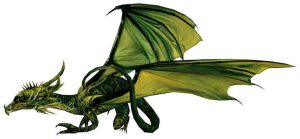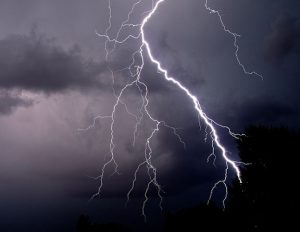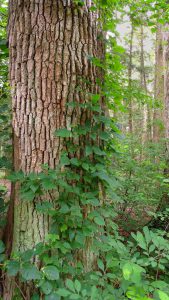Long ago, in a cabin deep in the forest, there lived a woodcutter’s wife who imagined on Christmas Eve that she saw an angel through the fog outside her window. That was, at any rate, how her husband described it when she told him about it.
“You’re imagining things, Lindy. It’s only a trick of the light reflecting from the snow,” he said impatiently. There were chores left to do, as always. Time couldn’t be wasted with foolish daydreams.
When Lindy looked again, nothing was there in the twilight but snow and fog. “Yes, that’s what it must have been, George,” she conceded, as she began closing the blinds.
Christmas morning dawned clear and bright. The only angels to be seen were the statues at the church and the ornament atop the tree. After church, Lindy had a busy day preparing the holiday meal with help from her daughters, who were grown and married with small children of their own, but lived nearby.
After the roast beef had been eaten and the gifts exchanged, Lindy wasn’t expecting to see anything besides a happy family around the tree. When she stepped outside on this frosty evening, she had in mind only to say goodnight to her departing children and grandchildren. Standing on the front walk, however, she distinctly saw a silvery figure with glowing wings in the moonlight.
“I saw the angel again just now, George,” she declared, as she stepped back into the cabin’s warmth. “At the edge of the clearing, where the road leads into the forest.”
“Hmph,” he snorted. His muscular neck rippled under his graying beard. “Nonsense. It’s probably the change of life—doesn’t that give women strange thoughts sometimes? You’d best come with me into town in the morning, so that you can see the herbalist while I deliver wood. Maybe there’s a potion for what ails you.”
Although Lindy hadn’t been feeling at all poorly, she supposed there couldn’t be any harm in seeing the herbalist. She felt certain that George meant well; he was a sensible man and a good provider. And, however distinct the figure might have looked to her, seeing angels surely was out of the ordinary.
“I’ll come along with you, George,” she agreed.
They rode into town early in the morning with a cartload of wood drawn by their brown ox, Ralph. Strong and well trained, Ralph had been a dependable beast for many years. When they reached the town’s narrow, cobblestoned streets, Lindy hopped down at the corner where the herbalist’s small shop stood. She crossed the street, being careful to hold her long dress up out of the half-frozen muck.
A bell jangled when Lindy pushed the door open. Candles gave off a pleasant apple-spice fragrance, illuminating shelves full of jars and sacks. The herbalist, a kindly woman named Kate who was short and round-cheeked, asked Lindy what had brought her to the shop on this fine winter’s day.
“Well, I don’t rightly know,” Lindy confessed, taking in a deep breath of the apple-scented air. “I saw an angel outside my cabin—twice. George says that I’m only imagining things, and he wanted me to ask if you have a potion for that.”
“For angels?” Kate’s friendly laugh was melodic, blending with the high chime of a clock that had started to strike the hour. “Most likely, you just have a touch of the winter blues. No cause for worry—a good tonic will soon have you feeling right as rain.”
Lindy left the shop with a small stoppered flask, which Kate assured her would remedy most winter ailments. She dutifully took her afternoon dose when she returned to the cabin with George. It tasted of mint, among other things. When no angels appeared for the rest of the day, Lindy went to bed thinking that perhaps she’d been cured.
She woke long before dawn the next morning, jolted out of a sound sleep by howling winds that shook the cabin ferociously. George hurried to hitch Ralph to the cart by lantern light. Tiny particles of swirling snow left no doubt that a bad storm was coming; today’s wood needed to get delivered right away, before it got worse.
“Stay indoors after you collect the eggs, Lindy,” he warned. “Don’t wander off chasing angels. It feels like there’s a blizzard on the way.”
Lindy nodded in agreement. She didn’t need any convincing; the wind-driven snow stung her face bitterly, even through a thick scarf. After George drove away, she plodded out to the chicken coop, head down, with no thoughts of anything but getting back inside the warm cabin. It wasn’t until she reached the coop that Lindy raised her head and saw the angel standing, large as life, only a few paces away.
“Who are you?” Lindy asked, looking into the angel’s shimmering silver eyes as the otherworldly figure loomed above her, wings outstretched as if about to take flight. “What do you want from me?”
The angel only smiled, extending a hand in invitation. When Lindy took a step closer, the angel, hovering just above the frozen ground, began to drift slowly back toward the forest. Lindy felt compelled to follow, even though George had told her to go back inside after getting the eggs. She hadn’t yet collected them, after all; so she wasn’t exactly breaking a promise.
Soon Lindy found herself among the trees. Dawn brought only a weak light, barely enough to see a path that was quickly becoming obscured by new-fallen snow. The angel still gleamed brightly, not far ahead of her.
Footsteps crunched to her left, and Lindy turned her head. She recognized her son Peter mainly by his tall stature and nimble gait, rather than by his face, which was covered against the biting wind like her own. He carried a sack over his shoulder, from which a beaver tail protruded.
“What are you doing out here in this storm, Mother?”
“I saw…”
Raising a hand to gesture toward the angel, Lindy looked in that direction again, only to find that the silvery glow had vanished. The path she had been following sloped gently downward, barely visible through the thickening snow.
“Nothing,” she said quietly, as much to herself as to Peter. “I must have imagined it.”
“Mother, go home now. Whatever you saw, this is no day for anyone to be out of doors. I’m going back to my cabin as soon as I check my last trap.”
Without any argument, Lindy turned back toward home. She made her way along the path as much by memory as by sight; the whirling snow blotted out every landmark. When she got home, she collected the eggs right away and went straight indoors, as George had told her to do. No more foolish visions of imaginary angels for her.
It was much later in the day when George returned, shivering and covered in snow. Lindy took his coat and hurried to pour him a mug of hot cider while he stood by the fireplace warming his numb hands.
The empty cart had overturned in a strong gust, George told her, not far from home. The harness had snapped. Ralph the ox, spooked by the crash of a tree falling close by, had bolted into the forest. His tracks had disappeared almost at once in the blowing snow, and George had not been able to find him anywhere.
“I’ll have to go back there right away and search for him again, Lindy. We can’t lose our only ox. If he’s not found soon, he could freeze to death or be taken by wolves.” George drained his cider, handed the mug back to Lindy, and reached for his coat. “Keep an eye out—it’s possible Ralph may come back on his own.”
After George trudged back out to the road, which couldn’t be seen at all by now, Lindy went to take a look around the outbuildings. There was no sign of Ralph, but of course that didn’t mean much; the snow was falling so heavily that Lindy couldn’t have seen the ox unless he came within arm’s reach.
Muttering about how useless this was, Lindy turned a corner of the barn and found the angel standing directly in front of her. A radiant, benevolent smile graced the angel’s smooth features. Lindy, however, was in a very uncharitable mood by now.
“Just what are you doing here, you horrid thing! Are you trying to get me killed in this blizzard?” She advanced on the angel, waving her fists furiously. “You’re not real—and even if you were, I don’t want you interfering in my life! What good are you? It’s all your fault that my husband thinks I’m crazy—and I may very well be losing my mind, talking to you when you can’t possibly be real! And now the ox is lost, and without him we’ll have no money to buy food this winter, and, and…”
Lindy had been taking angry steps toward the angel with every few words, not realizing what she was doing. All at once she noticed that she wasn’t standing next to the barn anymore. Instead, snow-covered trees surrounded her. The angel had led her into the forest without her being aware of it.
“Now I’m sure you must be trying to kill me!” Lindy shouted, turning on her heel to go back to the cabin. She had lost all sense of direction by now, though. It wasn’t possible to retrace her footsteps, which already had disappeared under the thick snow; and nightfall was coming fast.
After she blundered around for several minutes without coming back to the clearing, Lindy saw the angel with open hands, beckoning to her.
“And just why should I follow you,” Lindy demanded, “when you’re responsible for getting me lost? I have no reason to trust you. Less than no reason!”
The angel silently beckoned once more and then glided away through the trees, leaving Lindy alone in the deepening gloom without any idea of how to get home.
“Wait, wait, don’t go away—I didn’t mean it!” Now starting to panic, Lindy hurried to catch up to the angel’s fading glow. Rocks underfoot, snowbanks rising on both sides, and indistinct shapes of trees looming high overhead came together in Lindy’s mind, showing her where she was. The angel had led her into a ravine not far from her cabin.
Just ahead, an animal bellowed in fear and pain. It was the lost ox. Ralph had gotten his forelegs tangled in a pile of fallen branches and could not move. Although most of the branches were too large and heavy for Lindy to pick up, she found a smaller one that would work as a lever to shift the others. After a few minutes, she was able to free the ox. Ralph had a few cuts and bruises but was not much worse for wear.
When Lindy looked up, she was not surprised to find that the angel had disappeared. That was all right; she knew how to get home. The storm had almost ended, and the setting sun’s faint rays helped Lindy to find her way. Ralph obediently limped along beside her.
George came home soon afterward, while Lindy was in the barn tending to Ralph’s injuries.
“He was in the ravine,” Lindy said, rubbing more liniment on the right foreleg.
Looking puzzled, George asked, “How did you find him in the storm? The snow was so thick, I walked in circles for hours and couldn’t see a thing.”
“The angel showed me where he was.”
“Hmph.” George looked as if he might have wanted to say more, but then—evidently thinking better of it—he closed his mouth again. Lindy finished tending to the ox and went back inside the cabin with George.
——————————
The Crone’s knitting needles clacked busily away as she finished a row of her scarf-in-progress. Leaving it in her lap, where it had been when she started telling me this story, she picked up a gingerbread cookie from the plate on the end table.
“Did Lindy ever see the angel again?” I asked.
Taking a bite of her cookie, the Crone chewed meditatively for a moment before she gave the question back to me.
“Well, what do you think—did she?”
“Yes. Maybe.” I paused to arrange my thoughts in a more sensible order. “If she had a reason to. If something happened and she needed help.”
“Indeed.” The Crone gave me an encouraging smile before she went on to say, “Wayfinding is much easier when we trust that help will be there for us, even if it doesn’t always come as we might expect.”




